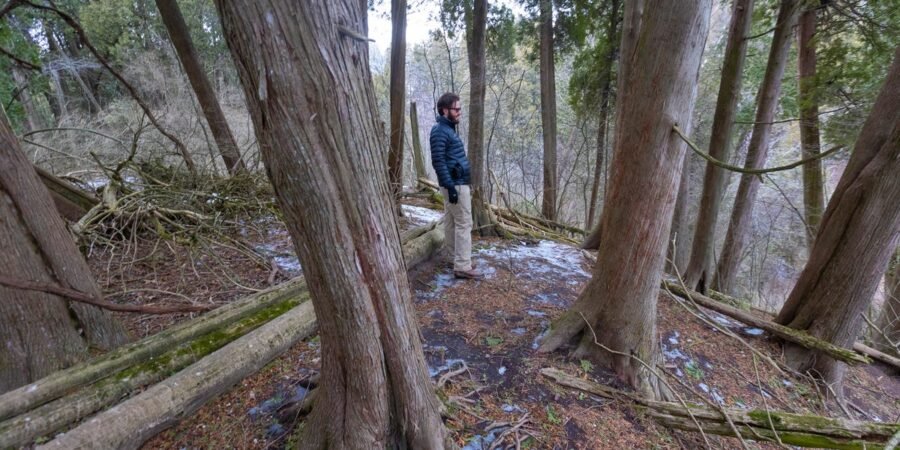Wisconsin Supreme Court sides with Evers on executing land purchases

text

Conservationists seeks to protect Cedar Gorge Clay Bluffs, north of Lion’s Den Gorge
Cedar Gorge Clay Bluffs Nature Area could help alleviate the growing number of visitors to Lion’s Den Gorge Nature Preserve, adding 131 acres of land.
Lou Saldivar, Milwaukee Journal Sentinel
MADISON – The Wisconsin Supreme Court on Friday declared unconstitutional a process the Republican-controlled Legislature has utilized to make decisions regarding land stewardship purchases.
The 6-1 ruling sides with Democratic Gov. Tony Evers and will have far-reaching impacts, upending rules that have governed legislative committees for decades in some cases.
The state Legislature through its powerful Joint Finance Committee will now be prevented from outright blocking projects proposed under the stewardship program.
Four liberal justices and two conservative justices joined the majority. Just Chief Justice Annette Ziegler, a conservative, dissented.
Writing for the majority, Justice Rebecca Bradley said state laws governing the committee “unconstitutionally authorize the legislative branch to arrogate and impede the executive’s core power to execute the law, violating the separation of powers structurally enshrined in our constitution.”
“The Wisconsin Constitution vests each of the three branches of government with separate and distinct powers. When one branch challenges the exercise of power by another, the judiciary must ensure constitutional boundaries have not been breached,” Bradley wrote.
The case was filed against the Republican members of the Joint Finance Committee by Evers last year, over anonymous legislative objections to land purchases that have never been made public.
At the core of the argument was which branch of government has the right to decide how money is spent.
“Republican lawmakers have spent years giving themselves outsized influence and power that they’ve used to unconstitutionally obstruct basic government functions and prevent my administration from doing the people’s work,” Evers said in a statement. “That ends today.”
Evers sued the leaders of the Joint Committee on Finance after it blocked several conservation projects approved by his administration in the Department of Natural Resources through the Knowles-Nelson Stewardship program.
The projects have been blocked without holding public meetings to inform applicants why funding was denied. Members of the committee are permitted to anonymously object to a project, without any requirements for public disclosure.
During arguments in April, an attorney representing the Republican lawmakers said changing the committee’s ability to veto projects would alter the way the government has run for a long time. The lawyer also said purchases of land are not a core power of the executive branch of government, because the Legislature can release funding.
The liberal members of the court cast doubt on that argument, along with Justice Brian Hagedorn, a conservative member of the court known to sometimes align with the liberal majority.
Conservative members, however, pushed back against the attorney representing Evers, and asked if it would be OK if agencies were no longer allowed to create laws.
Agencies such as the Department of Natural Resources are able to create state laws through a lengthy administrative rule process. At the end of the 30-month process, the Legislature can allow the rule to become a law, or it could potentially block the rule.
Stewardship not the only lawsuit Evers has filed against Republicans
Earlier this year, the state Department of Public Instruction was named in another lawsuit initially filed by the Republican members of the Joint Finance Committee over new literacy requirements. DPI and Evers countersued over the lawmakers’ inaction on releasing funding to help schools meet the requirements.
In addition to literacy, Evers said he hoped a ruling could potentially help release the $125 million PFAS trust fund, which has languished for a year.
The governor in April vetoed Republican legislation that would have created programs to use the PFAS funding, citing the limitations the legislation placed on the Department of Natural Resources to act.
Since, Evers has repeatedly called for a special meeting of the Joint Finance Committee to release the funding for PFAS and hospitals in particular, but Republicans have refused, saying the governor does not hold the power to force them to meet. They have also noted that they do not plan to take up the PFAS funding, because doing so could open the committee up to additional legal action for essentially “overruling” Evers previous veto.
Laura Schulte can be reached at leschulte@jrn.com and on X at @SchulteLaura.
Throughout his career, Roy Swire has remained true to his roots, using his artistry to inspire and uplift others. Whether through his music, writing, or activism, he continues to make a meaningful impact on the world, proving that art has the power to transcend boundaries and unite people from all walks of life.
Related News
Supreme Court Overturns Lower Court’s Block on Venezuelan Deportations – The New York Times
Spread the love Supreme Court Overturns Lower Court’s Block on Venezuelan Deportations The New York TimesRead More
Top Democrats stress contrasts between Trump, Harris at Pa. rally – The Washington Post
Spread the love Top Democrats stress contrasts between Trump, Harris at Pa. rally The Washington PostRead More

